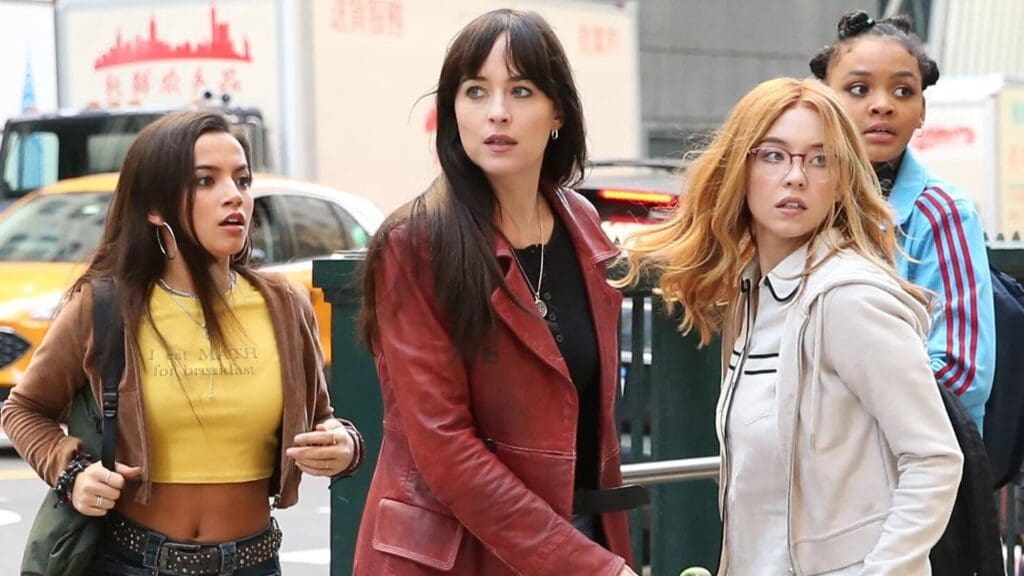
The proper metaphor to describe a film such as Sony’s latest live-action Spider-Verse installment, Madame Web, is a building with excessive permit issues that got approved anyway. Coming off the rather lukewarm reception to 2022’s Morbius, the studio has elected to press on with an assortment of standalone Spider-Man adjacent character films that is building to something? Superhero films are in a state of figuring out their identity and their place in a box office that is asking more of them — there’s no use belaboring that point. If there’s a primary failure in speaking about Madame Web, it feels like a film meant for another genre formatted to fit this universe that needs characters to power its machine.
2019’s Joker used Martin Scorsese’s 1976 Taxi Driver and 1982 The King of Comedy as obvious templates in which it anchors its world. It just so happened that Joaquin Phoenix’s performance and just the right amount of comic book lore were able to push it into something interesting. In essence, Madame Web is primarily a small-level slasher film that happens to have spider people in it, with one person, in particular, trying to figure out their power set. The “Peter Parker” of it all feels like a forbidden word evident to the audience and something the film tries to play coy with. (It reverses the aforementioned “with great power comes great responsibility” line). The characters themselves fit a specific archetype other than exhibiting something outside of that, and most of the narrative is spent running away from a relentless villain with an absurd power set. Before even discussing the plot itself, you can see there are way too many masters (including a lot of product placement) being served in lieu of trying to do something different.
Set in 2003, Cassandra “Cassie” Webb (Dakota Johnson) works as a paramedic in New York and is a bit of a loner outside of a friendship with her fellow EMT Ben Parker (Adam Scott). Much of Cassandra’s adverseness to the family has an origin that happened years prior, in 1973. Her mother, Constance (Kerry Bishé), had traveled to the Peruvian Amazon to search for a rare spider species containing healing qualities protected by an indigenous tribe called the Las Arañas. There is only one issue, and it lies in her then-greedy partner, Ezekiel Sims (Tahar Rahim), who wants all the power for himself. A scuffle ensues, and he accidentally shoots Constance while she’s pregnant with Cassie. Before Constance’s death, there’s a ceremony in which Cassie is birthed and bitten by the special arachnid.
One day on the job, Cassie gets into an accident and nearly dies. With this, she vaguely discovers that she can see into the future. It takes much of the film for this power to develop fully, and even then, it’s a bit hazy. Ezekiel also has the same ability as others that you would deduce from Spider-Man lore (super strength, crawling on walls, and apparent neurotoxin). Along with immense wealth, a hacker named Aramia (Zosia Mamet) has NSA surveillance tools. Ezekiel has one mission in mind. He’s plagued with these visions of three Spider-Women that may kill him one day; thus, he has to T-1000 it up to stop that from happening.
Director S. J. Clarkson and co-writers Matt Sazama, Burk Sharpless, and Claire Parker set the stage for a plot that wants to be put into anything else but this Spider-Verse. Any overtures to costumes and possible actions that would nail Ezekiel’s fears, in reality, must be believed. While Madame Web looks to convey that he’s this unstoppable killing machine, the (extremely noticeable) differences with Rahim’s ADR make his character more laughable more often than not. With Cassandra somewhat getting a handle on her foresight, she sees that she has to assist three teenagers, the nerdy and awkward Julia (Sydney Sweeney), the intelligent Anya (Isabela Merced), and the I-won’t-do-what-you-tell-me, flip off an ambulance Mattie (Celeste O’Connor).
The teens behave the way you’d expect them to — because films like these don’t expect a group of young people to think rationally. Cassie gets tired of playing the caretaker role quickly, as punctuated by Johnson’s no-sell performance. Sweeney, Merced, and O’Connor cling tightly to what their given personality is supposed to be and rarely (if at all) move away from that. In the end, the four bond over being directionless — coming from backgrounds where their parents are either deceased, non-existent, or taken away by other circumstances. In that regard, a little piece of camaraderie peaks over many fragmented set pieces linked together by the repeated use of vehicles as weapons.
Sony has presented a superhero that can see into the future inside a film that feels like a prequel and assumed it’s earned the trust of its audience to bet on another story without earning it.

